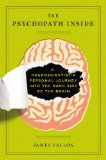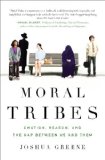new book – ‘The Psychopath Inside: A Neuroscientist’s Personal Journey into the Dark Side of the Brain’ by James Fallon
October 31, 2013
The Psychopath Inside: A Neuroscientist’s Personal Journey into the Dark Side of the Brain by James Fallon (Current, 2013)
Book description from the publisher:
“The last scan in the pile was strikingly odd. In fact it looked exactly like the most abnormal of the scans I had just been writing about, suggesting that the poor individual it belonged to was a psychopath—or at least shared an uncomfortable amount of traits with one….When I found out who the scan belonged to, I had to believe there was a mistake….But there had been no mistake. The scan was mine.”
For the first fifty-eight years of his life James Fallon was by all appearances a normal guy. A successful neuroscientist and medical school professor, he’d been raised in a loving, supportive family, married his high school sweetheart, and had three kids and lots of friends.
Then he learned a shocking truth that would not only disrupt his personal and professional life, but would lead him to question the very nature of his own identity.
The Psychopath Inside tells the fascinating story of Fallon’s reaction to the discovery that he has the brain of a psychopath. While researching serial murderers, he uncovered a distinct neurological pattern in their brain scans that helped explain their cold and violent behavior. A few months later he learned that he was descended from a family with a long line of murderers which confirmed that Fallon’s own brain pattern wasn’t a fluke.
As a scientist convinced that humans are shaped by their genetics, Fallon set out to reconcile the truth about his brain with everything he knew about the mind, behavior, and the influence of nature vs. nurture on our personalities. How could he, a successful scientist and a happy family man with no history of violence, be a psychopath? How much did his biology influence his behavior? Was he capable of some of the gruesome atrocities perpetrated by the serial killers he had studied?
Combining his personal experience with scientific analysis, Fallon shares his journey and the discoveries that ultimately led him to understand that, despite everything science can teach us, humans are even more complex than we can imagine.
Google Books preview:







